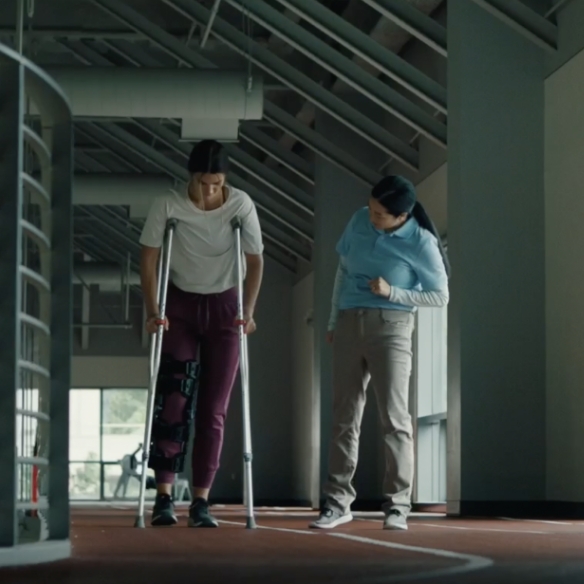No challenge. No change.
If you’re passionate about exercise, you’re likely not afraid to take on a challenge. After the MACI procedure, rehabilitation will be your new starting line on your journey back to health. Watch Jo’s journey from injury through rehab and beyond. Where will you go after MACI?
The following is an overview of the progression for rehabilitation from MACI.*
*Individual results for rehab may vary.
Achieve routine
0–3 months

- Return to light recreational exercise, including walking
- Perform daily routine and activities of daily living (navigating stairs, showering, etc.) with the assistance of crutches
- Start driving again and return to office or seated work
Build strength
3–6 months

- Return to low-impact recreational activities, including cycling, golf, yoga & pilates, rowing & kayaking, swimming, dancing, elliptical & treadmill
- Return to more physically active jobs, such as nursing or construction
- Return to daily activities that require strength and endurance
Be active
6–9 months

- Return to pre-injury sports-based recreational activities including, running distances, skiing & snowboarding, weight training, tennis
- Return to work for those in heavy labor fields, such as military deployment or firefighting
- Over time, heavy impact activities such as cutting or pivoting can be reintroduced
Post-rehabilitation
9+ months

“My rehabilitation helped me return to running, biking, even everyday activities.”
—Abby, MACI patient*
*Paid testimonial by a MACI patient. Individual results may vary.
Recovery from MACI treatment varies greatly.
That’s why your rehabilitation program is tailored specifically to your individual goals and objectives. Everyone heals at their own rate, and cartilage will continue to mature over time. Always follow the advice of your doctor as you get back to heavy impact activities, such as cutting or pivoting.

“My rehabilitation helped me return to running, biking, even everyday activities.”
—Abby, MACI patient*
*Paid testimonial by a MACI patient. Individual results may vary.
The videos are not intended to provide medical advice. Always talk to your healthcare provider with any questions. You should also talk to your healthcare provider before starting any exercise and to see if MACI may be right for you. Individual results will vary. Paid testimonial by a real MACI patient.
Courtney's Rehab
Taking control of my active lifestyle
Chris's Rehab
Keeping on the right path for recovery
Kayla's Rehab
A second chance at returning to activity
Abby's Rehab
A college athlete returns to action







